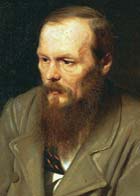Was Dostoevsky a Scoundrel?

The Russian novelist Fyodor Dostoevsky (1821–1881), rightly known as a peerless master of psychological fiction, a fierce anti-socialist polemicist, an anti-romantic with a pulsingly romantic commitment to prophetic religion, and a dramatist of moral ideas without compare since the English poet John Milton, also happened to harbor an ugly fixation on the Jews.
This has posed something of a problem for celebrators of Dostoevsky's genius. Prominent among them is the American critic Joseph Frank, whose five-volume life of the novelist, a work decades in the making and generally regarded as definitive, has now been capped by a one-volume condensation, Dostoevsky: A Writer in His Time. Frank is not alone in evading or tiptoeing around the problem of his hero's anti-Semitism, grudgingly acknowledging its presence but preferring to underplay its ubiquity or virulence, or to insist when pressed that, within the body of 19th-century Russian literature as a whole, Dostoevsky was "far from the worst offender."
The evidence, sometimes maniacal in its intensity, shows otherwise; it was gathered together and meticulously presented years ago by the American scholar David Goldstein. The only question is what honest admirers of Dostoevsky's artistry are to do with this evidence—the same question that has bedeviled admirers of the music of Richard Wagner, the poetry of T.S. Eliot, and the work of other indisputably major artists similarly disfigured by the world's oldest hatred.
A reviewer of Goldstein's 1981 book, concluding that "little can be said to exonerate" Dostoevsky, proposed the need to keep always in mind "the truth of Dostoevsky's own insight that ‘the greatest artists could be the worst scoundrels and that there was nothing incompatible between the two.'" Others may persist in wondering.
Comments are closed for this article.




